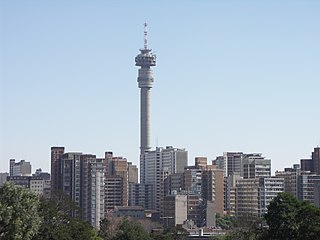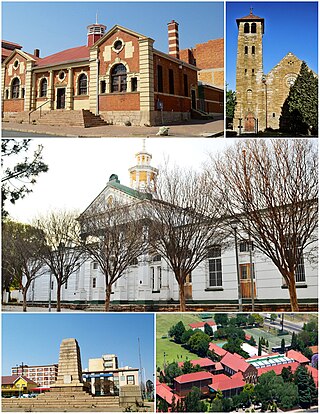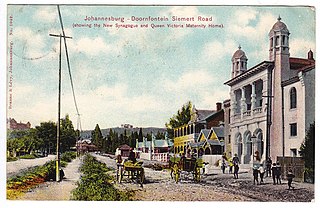
Pretoria, is South Africa's administrative capital, serving as the seat of the executive branch of government, and as the host to all foreign embassies to South Africa.

Hillbrow is an inner city residential neighbourhood of Johannesburg, Gauteng Province, South Africa. It is known for its high levels of population density, unemployment, poverty, prostitution and crime.

Johannesburg is a large city in Gauteng Province of South Africa. It was established as a small village controlled by a Health Committee in 1886 with the discovery of an outcrop of a gold reef on the farm Langlaagte. The population of the city grew rapidly, becoming a municipality in 1898. In 1928 it became a city making Johannesburg the largest city in South Africa. In 2002 it joined ten other municipalities to form the City of Johannesburg Metropolitan Municipality. Today, it is a centre for learning and entertainment for all of South Africa. It is also the capital city of Gauteng.

Springs is a former independent city that is now part of the City of Ekurhuleni, based in the east of Johannesburg, in Gauteng Province, South Africa. It lies 50 km (31 mi) east of Johannesburg and 72 km (45 mi) southeast from Pretoria. Its name derives from the large number of springs in the area, and its estimated population is more than 121,610 in 2011. It is situated at 1,628 m (5,341 ft) above sea level.

Boksburg is a city on the East Rand of Gauteng province of South Africa. Gold was discovered in Boksburg in 1887. Boksburg was named after the State Secretary of the South African Republic, W. Eduard Bok. The Main Reef Road linked Boksburg to all the other major mining towns on the Witwatersrand and the Angelo Hotel (1887) was used as a staging post.
Yeoville is an inner city neighbourhood of Johannesburg, in the province of Gauteng, South Africa. It is located in Region F. Originally intended as a "well-to-do" neighbourhood, it instead developed into a white working class and lower middle class area as the city expanded northwards and public rail access improved. From the 1920s onwards it became a significant enclave of German Jewish and Eastern European Jewish immigrants. It was designated as a "white area" under the Group Areas Act during the apartheid era. It became a "grey area" in the 1980s, as a limited number of non-white residents began to rent in the area. From the end of the 1970s, a growing number of night clubs and galleries opened in Yeoville, or relocated from Hillbrow. This led to the neighbourhood becoming the leading nightspot in the city.The white population began to decline in the 1970s, and this white flight accelerated in the early to mid 1990s, with most residents migrating to the northern suburbs. Today, it is widely known and celebrated for its diverse, pan-African population but notorious for its high levels of crime, poverty and degradation.
Rosettenville is a working class suburb of Johannesburg, South Africa. It lies to the south of the city centre.

Glenhazel is a suburb of Johannesburg, South Africa. It is located in Region E, bordering Fairmount, Sandringham, Lyndhurst and Percelia Estate. The area lies on a sloping hill with a park in the valley. It is known for its large Jewish population as well as for being home to the largest Jewish kosher hub in Johannesburg, which attracts many Jewish tourists.
Houghton Estate, often simply called Houghton, is an affluent suburb of Johannesburg, South Africa, north-east of the city centre.
Berea is an inner city neighbourhood of Johannesburg, in the South African province of Gauteng. It is east and adjacent to the Johannesburg CBD. It is located in Region F of the City of Johannesburg Metropolitan Municipality.
Doornfontein is an inner-city suburb of Johannesburg, South Africa, located to the east of the city centre. It is in Region F of the City of Johannesburg Metropolitan Municipality. In the 1930s, it attracted many Jewish immigrants, becoming the main hub for the city's Jewish community. Black African residents, then a minority in the suburb, lived in slum-yards. Under the Slums Clearance Act 1934, the slum-yards were cleared and many residents were relocated to Orlando, Soweto. Since the late 1970s, Doornfontein and other inner-city suburbs of Johannesburg have underdone high levels of white flight to the city's northern suburbs.

Marshalltown is a suburb of Johannesburg, South Africa. It is located in Region F of the City of Johannesburg Metropolitan Municipality.
Braamfontein is a central suburb of Johannesburg, in South Africa, seat of the Constitutional Court of South Africa and some of South Africa's major corporations such as Liberty Holdings Limited, JD Group, Sappi, and Bidvest Bank and Hollard. Situated due north of the city centre, Braamfontein is the fourth-largest office node in the city of Johannesburg containing many multi-storied buildings representing various architectural styles including Art Deco and Brutalist. Numerous office buildings have and are in the process of being converted to residential apartments. The offices of the Johannesburg City Council and the University of the Witwatersrand are situated in Braamfontein. The Nelson Mandela Bridge is a landmark that connects Braamfontein to the city centre, traversing South Africa's most extensive passenger train marshalling yard. Jan Smuts Avenue and Empire Road are two major road thoroughfares that run through the suburb.
The Oxford Shul is an Orthodox synagogue in Riviera, Johannesburg near the suburbs of Saxonwold, Houghton and Killarney. The congregation was established in 1943 and moved into its current building in 1962. The sanctuary is one of the largest in the Southern Hemisphere, with seating for 1,500 congregants.

The Fremantle Synagogue is a heritage listed building located on South Terrace on the corner of Parry Street in Fremantle, Western Australia. It was the first synagogue built in Western Australia and was associated with Jewish community leaders and merchants in Fremantle at the end of the 19th century. The building is also known as Beers building.

The Doornfontein Synagogue or Lions Synagogue is the oldest synagogue still in use in Johannesburg, South Africa.
The Great Park Synagogue is an Orthodox synagogue situated in Houghton, Johannesburg. The present building was consecrated in 2000, after the congregation vacated their long-time home, the Great Synagogue on Wolmarans Street, Hillbrow in 1994, after eighty years. The Wolmarans Street synagogue came to be known as the city's mother synagogue and "the crown jewel of Orthodox Judaism in South Africa." All large-scale Jewish events in Johannesburg were held in the building, and throughout its existence it was the seat of the country's chief rabbi. Northward migration by congregation members led to the synagogue closing its doors in 1994. The relocated synagogue was built on the model of the Great Synagogue, whose own architecture in turn was inspired by the Hagia Sophia. Great Park Synagogue was also the original name of the synagogue on Wolmarans Street before it became the Great Synagogue.
The Temple Israel is a Progressive Jewish congregation and synagogue, located in Hillbrow, a suburb of Johannesburg, in the district of Gauteng, South Africa. Designed by Hermann Kallenbach in the Art Deco style, the synagogue was completed in 1936 and is the oldest of eleven Progressive synagogues in South Africa. The synagogue is classified as a provincial heritage site. The congregation is affiliated with the South African Union for Progressive Judaism (SAUPJ), which is part of the World Union for Progressive Judaism (WUPJ).
Beit Emanuel is a Progressive Jewish congregation and synagogue, located in Parktown, a suburb of Johannesburg, in the district of Gauteng, South Africa. The synagogue was established in 1954 and is one of the largest Progressive Jewish congregations in South Africa. It is an affiliate of the South African Union for Progressive Judaism (SAUPJ), which is part of the World Union for Progressive Judaism (WUPJ).

The Old Synagogue, also known as The Pretoria Hebrew Congregation, is a former Orthodox Jewish congregation, synagogue, and apartheid-era court house on Paul Kruger Street in Pretoria, South Africa. It was consecrated in 1898 and closed as a synagogue in 1952, when the congregation moved to a larger site. The former synagogue building was subsequently expropriated and sold to the State for use as a Special Annex of the Supreme Court of South Africa between 1956–1977. In this period, Nelson Mandela was a defendant at the court in both the 1956 and the Rivonia treason trials. In 1977, it was the setting for an inquest into the death of Steve Biko. It is now a Grade II Provincial Heritage Resource and protected under the National Heritage Resources Act. The building and site remains under the control of the Department of Public Works and Infrastructure.









